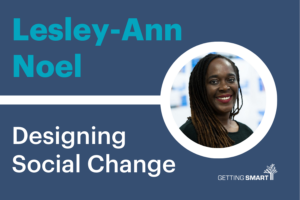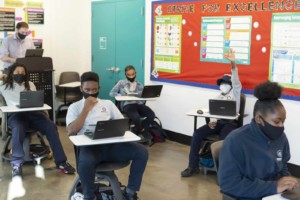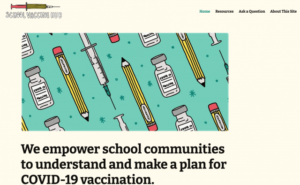The Key to Addressing Covid-19 Vaccine Hesitancy: Public Schools
[…] struggling the most. How Public Schools Can Make a Difference Schools can promote more equitable vaccination uptake in several ways. For starters, they already are places of learning, so students—and their families, for that matter—expect to expand their knowledge and comfort zones with interactions therein. Second, from a historical and cultural perspective, schools represent […]
Why We Built a Hub for Vetted Vaccination Resources for Public Schools
[…] the School Vaccine Hub will reach thousands of schools through a distribution partnership with more than 80 educational organizations from the EALA, including the National Center for Learning Disabilities, the Center for Learner Equity, InnovateEDU, Digital Promise and ISTE. We look forward to seeing schools embrace the resource, and hope it will empower them […]
The Journey Of One High School Counselor’s Efforts To Redefine College Advising For All
[…] we’re from or where others are going, then we might be missing out on our best opportunities,” said Kazan. Proper Advising Kazan said that accurate information and personalized college advising are more important than ever before. “You don’t know what you don’t know,” said Kazan. “Once I explain how this works, it makes sense. […]
Schools Can Give America a Shot At Vaccine Equity
[…] vaccinated. Some may argue that schools don’t have the time and resources to engage in the vaccine effort. Educators are overwhelmed trying to manage remote, in-person, and hybrid learning, while also supporting school communities that have endured unimaginable trauma and loss. This argument is valid, and schools do need extra support to take this on. But this is […]
The Wallet Test: How Honest Are You?
[…] either. Do talk about honesty. Tell stories that show you know how hard it can be to tell the truth. Show your kids that you, too, are learning how to do the right thing. With grit and gratitude, Angela For more, see: Making Kindness Common: How to Raise Kind Kids Step Outside: Have an […]
A Dashboard is Not A Plan
[…] school district to ensure their success and how can we do more of that? Was it rigorous courses, extra-curricular participation, a caring adult mentor, an authentic work-based learning experience, or helping them complete their financial aid and select a well matched college option? Now more than ever, education leaders are seeking more holistic insights […]
To Improve STEM Education, We Must Democratize It
[…] democratic STEM teaching framework empowered me to welcome feedback from my students, iterate my approach to teaching to better fit their needs, and create a more equitable learning space. I became invested in elevating my students’ voices, sharing authority in the classroom, and centering my teaching around developing their ability to think about STEM […]
Codesigning the Future of Edtech Tools
[…] school systems as a moment of opportunity, a chance for reckoning inside a system that needed to find ways to distribute effective solutions more equitably, to make learning more engaging, relevant, and creative, to make the teaching profession more humane. Instead of a system reimagined, we’re left with what might look like a promise […]
Mind the Artificial Intelligence Gap
[…] powerful or important or needed. To the contrary, we’ve only just started to see the benefits and rewards of what AI can do to improve teaching and learning. We are, in my view, just at the dawn of leveraging AI in education. Nearly everywhere we look, the solutions and capabilities that AI can deliver […]
Eating Together: Sharing Food Brings You Closer
[…] other children.” We found that students with food restrictions were less integrated—in other words, they were lonelier. Kids who were new to the class or had a learning difficulty had an even harder time socially, but having a food allergy had a bigger impact on loneliness than being a non-native English speaker did. Meals […]










